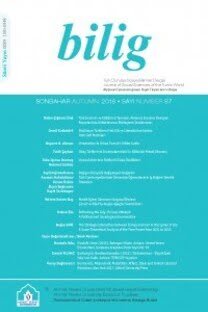Eğiticinin Performansını Niteleyen Faktörler
Yüksek öğretim kurumlarında görev yapan eğiticilerin pedagojik performanslarına katkı sağlamak amacıyla gerçekleştirilen bu araştırma, iki ana bölümden oluşmaktadır. Birinci bölümde, Vroom’un (VİE) Değer-Araçsallık-Beklenti (Valance–Instrumentality-Expectancy Theory) Kuramı özetlenmektedir. İkinci bölümde ampirik veriler sunulmaktadır. Faktör analizi ile, eğiticiye ilişkin pedagojik performans değer faktörleri belirlenmekte ve değişkenler arasındaki ilişkiler yorumlanmaktadır. Sonuç bölümünde, öğrenci tarafından dersi dikkat ve ilgiyle izlenecek bir eğitici portresi çıkartılmaya çalışılmakta ve öneriler sunulmaktadır.
Factors Determining the Performance of Educators
This study has been conducted for the purpose of positively contributing to the pedagogic performance of educators in higher education institutions. The study consists of two parts. The first part summarizes Vroom’s Valance-Instrumentality-Expectancy Theory (VIE). The second part presents empirical data. Here pedagogic performance value factors concerning the educator are determined through factor analysis, and an interpretation of the relationship between the variables is provided. This study concludes by trying to determine the characteristics of an educator with an ability to keep student attention and makes suggestions to this end.
___
ADAIR John (2003), Etkili Motivasyon (Çev: Salih Uyan), İstanbul, Babaili Kültür y.AMES Carole ve R. Ames (ed.). (1985), Research On Motivation In Education, New York, Academic Pres, Inc.
ANIK, Cengiz (2000), Siyasal İkna, Ankara: Vadi y.
ASHTON Patricia T. And Romdan B. Webb (1986), Making A Difference Teachers’ Sense Of Efficacy and Student Achievement. New York: Longman
ATKİNSON, john W. (1964), An Introduction to Motivation. Washington: D. Van Nostrand Company,
BACANLI, Hasan (2000), Gelişim ve Öğrenme, Nobel y. Ankara
BAŞARAN İ. Ethem (1991), Örgütsel Davranış. Ankara, Kadıoğlu M.
BREWER Marilyn B. and M. HEWSTONE (ed.). (2004), Emotion and Motivation. Blackwell Publishing
CAN, Halil (1985), Başarı Güdüsü ve Yönetsel Başarı, Ankara, H.Ü. İİBF y.
COFER, C. N. ve M. H. APPLEY (1964), Motivation: Theory and Research. New York: Wiley
DAVIS Keith (1984), İşletmede İnsan Davranışı Örgütsel Davranış (Çev: K.Tosun v.d.). II.Basım, İstanbul: İ.Ü. Yayınları No: 3028
DERELİ, Toker (1985), Organizasyonlarda Davranış. İstanbul: Ar y.
EREN, Erol (1991), Yönetim ve Organizasyon. İstanbul: İ.Ü. İ F. Y., NO: 236
GRAY, Roderic (2004), How People Work. New York Prentice Hall
İNCEOĞLU, Metin (1985), Güdüleme Yöntemleri. Ankara: AÜBYYO Yayınları No:4
KRECH, D. R.S. CRUTCHFIELD, (1970), Sosyal Psikoloji, (Çev: E.Güngör) II. Baskı, İstanbul İ.Ü.E.F. y. No: 1154
KÜÇÜKURT, Mehmet, (1988) Uluslararası Turizm ve Türkiye’yi Tanıtma Stratejisi. İzmir: Abam y.
MASLOW, Abraham H. (1954), Motivation and Personality. New York: Harper
MULAIK, A.S. (1972) The Foundation of Factor Analysis, Mc Graw-Hill Company.
MURRAY, Edward J. (1964), Motivation and Emotion. New Jersey: Prentice-Hall
RUSSELL, Wallace A., (1970) Milestones in Motivation: Contributions to the Psychology of Drive and Purpose. New York: Appleton-Century-Crofts
STİPEK Deborah (1988), Motivation To Learn From Theory to Practice. Boston, Allyn and Bacon0
STEERS, R. M. ve L. W. PORTER (1987), Motivation and Work Behavior, 4. Bası, New York: Mc Graw- Hill Publishing Company
ONARAN, Oğuz. (1981), Çalışma Yaşamında Güdüleme Kuramları. Ankara, Sevinç Matbaası
TEKARSLAN, Erdal v.d. (1989), Sosyal Psikoloji. İstanbul: Filiz Kitapevi
VROOM, H. Victor (1964), Work and Motivation. New York: Wiley
BAYSAL, Can (1989), “Tutumlar”, Erdal TEKARSLAN v.d. Sosyal Psikoloji. İstanbul: Filiz Kitapevi, Sahife 166-202
BIRNEY, R. C. ve L. I. O’KELLY (1968), “Motivation”, David L. SİLLS (Ed.), İnternational Encyclopedia ofThe Social Sciences. Volume 9 and 10, New York: Crowell Collier and Mac Millian, Sahife 507-522
ERGÜL H. Fazlı, “Motivasyon ve Motivasyon Teknikleri”, Elektronik Sosyal Bilimler Dergisi, Güz 2005, C:4, s:14, Sahife: 67-79
GÜVENÇ, Bozkurt (1976), “Değerler, Tutumlar ve Davranışlar”, Ruşen KELEŞ (Der.) Toplum Bilimlerinde Araştırma ve Yöntem”. Ankara: Sevinç M., Sahife 23-33
KAĞITÇIBAŞI, Çiğdem (1976), “Ölçme ve Ölçekleme”, Ruşen KELEŞ (Der.) Toplum Bilimlerinde Araştırma ve Yöntem”. Ankara: Sevinç Matbaası, Sahife:79-112
MİTCHELL, Terence R. (1987), “Motivation: New Directions for Theory, Research, and Practice”, R.M.STEERS ve L.W. PORTER (Ed.), Motivation and Work Behavior. 4. Bası, New York: Mc Graw- Hill Publishing Company, Sahife 27 - 39
PINDER, Craig P. (1987), “Valance-Instrumentalıty-Expectancy Theory”, R. M.
STEERS ve L.W. PORTER (Ed.), Motivation and Work Behavior. 4. Bası, New York: Mc Graw-Hill Publishing Company, Sahife 69 - 89
STEERS, Richard M. (1987), “Murray’s Manifest Needs Theory”, R. M. STEERS ve L.W. PORTER (Ed.), Motivation and Work Behavior. 4. Bası, New York:Mc Graw-Hill Publishing Company, Sahife 59 - 66
WAHBA Mahmoud A.- BRİDWELL Lawrence G. (1987), “Maslow Reconsidered: A Review of Research on the Need Hierarchy Theory”, R. M. STEERS ve L.W. PORTER (Ed.), Motivation and Work Behavior. 4. Bası, New York: Mc Graw-Hill Publishing Company, Sahife 51 - 58
- ISSN: 1301-0549
- Yayın Aralığı: Yılda 4 Sayı
- Başlangıç: 1996
- Yayıncı: Ahmet Yesevi Üniversitesi Mütevelli Heyet Başkanlığı
Sayıdaki Diğer Makaleler
Köl Tigin Yazıtının Kuzey Yüzünün 6. Satırında Bir Düzeltme Denemesi ve Bir Öneri
Türk İmalat Sanayiinde İllere Göre Yerelleşme ve Kentleşme Ekonomilerinin Belirlenmesi
Ümit SEYFEDDİNOĞLU KIYMALIOĞLU, Damla AYOĞLU
Tatar Türklerinde Mitolojik Varlıklarla İlgili Mitler ve İnanışlar (İyeler ve Yaratıklar)
MURAT DEMİRBAŞ, RAHMİ YAĞBASAN
Çankırı Fatihi Karatekin'in Türbesi
Sibirya Türklerinde Ateşle İlgili İnançlar, Törenler ve Bazı Efsaneler
